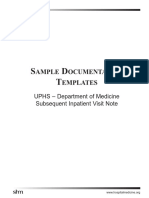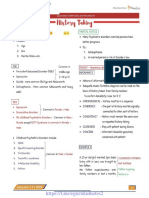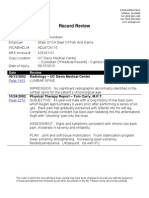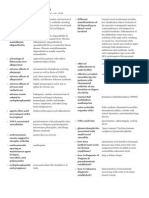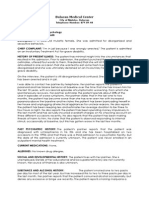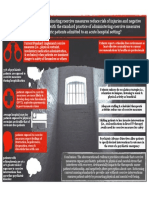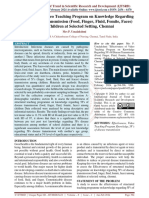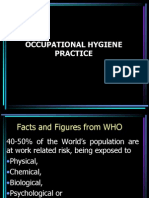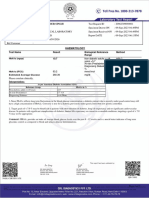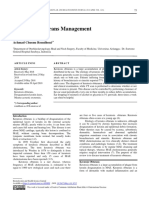Ebp Handout
Uploaded by
api-543558169Ebp Handout
Uploaded by
api-543558169Do Evidence Based Practice Guidelines Recommend Screening for Risk of QTc
Prolongation Among Hospitalized Adult Psychiatric Patients Prescribed an
Antipsychotic Medication Regimen? Presented By: Aleece Churney
PICO: Current Protocol:
Patient Population: Patients 18 and older admitted to the Behavioral Health Unit ECGs and cardiology consults
at Winchester Medical Center and prescribed antipsychotic medications. ordered as needed by physician
Intervention: Evidence based practice recommendations including QTc De-escalation nursing
Prolongation Risk Assessment on admission, baseline ECG for all patients prior interventions for psychiatric
to beginning or altering antipsychotic medication regimens and providing exacerbations:
patient/caregiver education about the risk for QTc prolongation. o Socializing with peers
Comparison: Current protocol on the Behavioral Health Unit in which physicians o Group therapy
order ECGs and cardiology consults as needed and de-escalation nursing o Distraction Activities i.e.,
interventions are implemented as psychiatric exacerbations arise. journaling, drawing, walking
Outcome: Improve patient safety and reduce risk of adverse health outcomes by around the unit, watching
increasing QTc prolongation detection among hospitalized psychiatric patients TV, taking a shower and
prescribed an antipsychotic treatment regimen. listening to music.
Purpose:
Rate of sudden cardiac death is double among patients receiving antipsychotic treatment regimens. Antipsychotic
medications interact with potassium channels leading to a prolonged QTc interval increasing the risk of ventricular
tachycardia, especially torsades de pointes (TdP) (Ansermot et al., 2019).
Initially reported as a rare complication, new evidence suggests the prevalence of developing TdP ranges from 10-100x
more than originally estimated and is associated with a 10% mortality rate (Funk et al., 2018; Zolezzi & Cheung, 2019).
In 2005, the U.S. F.D.A. began assessing for QTc prolongation in the regulation and approval process of novel drugs due to
the significant association between medication induced QTc prolongation and TdP (Xiong et al., 2020).
Researchers identified the strongest risk factor for prolonged QTc as polypharmacy of antipsychotics (Xiong et al., 2020).
Evidence Based Practice Recommendations:
Baseline ECGs:
Baseline ECGs are recommended for all psychiatric patients prior to starting or altering dosing of antipsychotics (Ansermot
et al., 2019; Xiong et al., 2020). ECG QTc data are most effective for determining TdP risk (Funk et al., 2018).
Roughly 30% of baseline ECGs for psychiatric patients were irregular. Among psychiatric patients with prolonged QTc from
meds, 20% experienced TdP or sudden cardiac death within 3 days (Ansermot et al., 2019).
QTc prolongation is associated with a 3x higher susceptibility to sudden cardiac death within 7 years of detection compared
to individuals without QTc prolongation. In patients over 68 years old, this risk is 8x higher (Funk et al., 2018).
Cost-benefit analysis determined that collecting baseline ECGs during admission on all psychiatric patients to mitigate the
risk of sudden cardiac death is financially advantageous (Ansermot et al., 2019).
QTc Prolongation Risk Assessment:
In the absence of continuous ECG monitoring, QTc prolongation risk assessment is an effective tool for mitigating sudden
cardiac death related to medication regimens (Funk et al., 2018).
QTc Prolongation Risk Factors—female, 65 or older, malnourished, alcohol and/or methamphetamine abuse, electrolyte
abnormalities, bradycardia, coronary artery disease, congestive heart failure, structural heart disease, congenital or acquired
Long QT Syndrome, history of sudden cardiac death in 1st degree relative, prescribed 2+ meds that prolong QTc, and/or
120mg or more of methadone daily (Xiong et al., 2020). Refer to Table 1 and Table 2 for scoring.
o Roughly 85% of prolonged QTc cases from meds are associated with 2+ risk factors (Xiong et al., 2020).
Patient and Caregiver Education:
Patient and caregiver education are recommended to address the advantages and complications (i.e., QTc prolongation)
associated with antipsychotic medications. Ensure the patient is in the cognitive capacity to make informed decisions about
their care prior to providing patient teaching (Xiong et al., 2020).
Educate patients and caregivers on modifiable risks for QTc prolongation including acute sickness, low potassium and/or
magnesium levels and taking 2+ meds that prolong QTc (Xiong et al., 2020).
The risk of developing fatal QTc prolongation with antipsychotic medications significantly increases when taken with
azithromycin, methadone, sertindole, amiodarone, sotalol and/or dofetilide. Figure 1 displays specific parameters for QTc
prolongation among commonly prescribed antipsychotics (Xiong et al., 2020).
Patients experiencing fainting, dizziness and palpitations are recommended for cardiology consult (Funk et al., 2018).
Table 1 Implementation in Practice: Figure 1
QTc Prolongation Risk Assessment On Admission: Antipsychotic Effect on
Risk Factor Points QTc Prolongation Risk QTc Interval
Assessment for all patients
Female 1
Baseline ECG for patients
≥ 65 years 1 currently taking or will be
Starvation, Alcohol Use Disorder, prescribed antipsychotics and
1
Methamphetamine Use Disorder patients scoring 2 or higher on
Potassium (K) < 3/2mmol/L 2 QTc Prolongation Risk
Assessment
Magnesium (Mg) < 1.4mg/dL 2 Cardiology consult for patients
Heart Rate < 60 bpm 2 scoring 5 or more on QTc
Heart Disease (CAD, CHF, Prolongation Risk Assessment
2 (Xiong et al., 2020)
Structural Heart Disease)
Congenital or Acquired Long QT During Treatment:
3 Continuing to provide de-
Syndrome
escalation nursing interventions
History of Sudden Cardiac Death in
3 for all patients, especially for
1st Degree Family Member
patients with a QTc
≥ 2 QTc Prolonging Agents 2 Prolongation Risk Assessment
Methadone Dose ≥ 120mg daily 2 score of 2 or more
Follow-up ECGs with dosage
(Taken from Xiong et al., 2020) changes and when starting new
antipsychotics (Xiong et al.,
2020)
Table 2 During Discharge:
QTc Prolongation Risk Teach patient and caregiver
Assessment Scoring about medication induced QTc
prolongation and modifiable
Score Nursing Intervention risks for patients prescribed
<2 Routine Monitoring antipsychotics
≥2 Baseline ECG Direct patient to seek care if
they experience dizziness,
≥5 Cardiology Consultation (Taken from Xiong et al., 2020)
fainting, and/or palpitations
(Taken from Xiong et al., 2020) (Xiong et al., 2020).
Implementing Evidence Based Research in Clinical Practice for Novice Nurses:
Before transfer to the Behavioral Health Unit, effectively communicate with the reporting nurse to determine if patient
received an ECG and verify results within the patient’s electronic medical record (EMR) to promote continuity of care.
During admission, complete QTc Prolongation Risk Assessment and collect baseline ECG for patients anticipated to receive
antipsychotic treatment to integrate evidence-based practices and technological science into patient care.
Collaborate with interdisciplinary team by effectively communicating results of patient’s ECG and QTc Prolongation Risk
Assessment and advocate for cardiology consult as appropriate (history of cardiac conditions or prolonged QTc, more than 5
points on QTc Prolongation Risk Assessment and urgent referral with syncope, vertigo and palpitations).
Synthesize patient’s QTc Prolongation Risk Assessment score with development of an individualized care plan to anticipate
patient’s needs and implement patient-centered nursing interventions to promote patient safety (i.e., de-escalation nursing
interventions to mitigate psychiatric exacerbations for patients at high risk for QTc prolongation).
References
Ansermot, N., Bochatay, M., Schlapfer, J., Gholam, M., Gonthier, A., Conus, P., & Eap, C. (2019). Prevalence of ECG abnormalities and risk factors
for QTc interval prolongation in hospitalized psychiatric patients. Therapeutic Advances in Psychopharmacology, 9, 1- 13. doi:
10.1177/2045125319891386
Funk, M., Beach, S., Bostwick, J., Celano, C., Hasnain, M., Pandurangi, A., Khandai, A., Taylor, A., Levenson, J., Riba, M., & Kovacs, R. (2018).
Resource document of QTc prolongation and psychotropic medications. American Psychiatric Association, 1-42.
Xiong, G., Pinkhasov, A., Mangal, J., Huang, H., Rado, J., Gagliardi, J., Demoss, D., Karol, D., Suo, S., Lang, M., Stern, M., Spearman, V., Onate.,
J., Annamalai, A., Saliba, Z., Heinrich, T., Fiedorowicz, J. (2020). QTc monitoring in adults with medical and psychiatric comorbidities:
Expert consensus from the Association of Medicine and Psychiatry. Journal of Psychosomatic Research, 135, 1-8. doi:
https://doi.org/10.1016/j.jpsychores.2020.110138
Zolezzi, M. & Cheung, L. (2020). A literature-based algorithm for the management and monitoring of drug QTc prolongation in the psychiatric
population. Neuropsychiatric Disease and Treatment, 15, 105-114. doi: http://dx.doi.org/10.2147/NDT.S186474
You might also like
- Trusted Evidence For Confident Clinical Decisions: Resources For Medication, Disease, and ToxicologyNo ratings yetTrusted Evidence For Confident Clinical Decisions: Resources For Medication, Disease, and Toxicology10 pages
- IBE, Susanna Martha B. 2014-57561 Ward 1No ratings yetIBE, Susanna Martha B. 2014-57561 Ward 14 pages
- UCLA Fundamentals of Clinical Medicine Physical Exam Skills Checklist Student - GroupNo ratings yetUCLA Fundamentals of Clinical Medicine Physical Exam Skills Checklist Student - Group5 pages
- Differential Diagnosis: Disease/Condition Differentiating Signs/Symptoms Differentiating Tests100% (1)Differential Diagnosis: Disease/Condition Differentiating Signs/Symptoms Differentiating Tests4 pages
- Lecture No. 3 Semiology of Psychiatry Part 2No ratings yetLecture No. 3 Semiology of Psychiatry Part 226 pages
- Hippo EM Foundations - Neurology Written SummaryNo ratings yetHippo EM Foundations - Neurology Written Summary13 pages
- Pediatric Emergency Medicine Resource 33164 - CSDY - FeverNo ratings yetPediatric Emergency Medicine Resource 33164 - CSDY - Fever7 pages
- Hippo EM Board Review - Toxicology (New 2017) Written SummaryNo ratings yetHippo EM Board Review - Toxicology (New 2017) Written Summary15 pages
- Clinical Reasoning On Doc Faculty Dev Tuesday VersionNo ratings yetClinical Reasoning On Doc Faculty Dev Tuesday Version76 pages
- Psychiatry Case Clearking Updated Feb April 2018No ratings yetPsychiatry Case Clearking Updated Feb April 201812 pages
- Treatment of Resistant and Refractory Hypertension100% (1)Treatment of Resistant and Refractory Hypertension21 pages
- H&P and Dictation Template - Right Handed (6!4!15)0% (1)H&P and Dictation Template - Right Handed (6!4!15)1 page
- Hippo EM Board Review - Infectious Disorders (New 2017) Written SummaryNo ratings yetHippo EM Board Review - Infectious Disorders (New 2017) Written Summary19 pages
- MS Myasthenia Gravis Gillian-Barre Syndrome Parkinson's: Ascending Reversible ParalysisNo ratings yetMS Myasthenia Gravis Gillian-Barre Syndrome Parkinson's: Ascending Reversible Paralysis5 pages
- A Simple Guide to Hypovolemia, Diagnosis, Treatment and Related ConditionsFrom EverandA Simple Guide to Hypovolemia, Diagnosis, Treatment and Related ConditionsNo ratings yet
- Heart, Functions, Diseases, A Simple Guide To The Condition, Diagnosis, Treatment And Related ConditionsFrom EverandHeart, Functions, Diseases, A Simple Guide To The Condition, Diagnosis, Treatment And Related ConditionsNo ratings yet
- Churney Physical Restraints in Psychiatric Nursing CareNo ratings yetChurney Physical Restraints in Psychiatric Nursing Care8 pages
- Congestive Heart Failure !1 Running Head: Congestive Heart FailureNo ratings yetCongestive Heart Failure !1 Running Head: Congestive Heart Failure11 pages
- Rehab For Autism and ADHD - Autism Treatment in PatnaNo ratings yetRehab For Autism and ADHD - Autism Treatment in Patna11 pages
- Spirit 2023 Benefits - FT - Pilots - Day - One - BenefitsNo ratings yetSpirit 2023 Benefits - FT - Pilots - Day - One - Benefits4 pages
- Urban Fire Disaster Mitigation Policy (Case Study of Fires in The City of Jakarta)No ratings yetUrban Fire Disaster Mitigation Policy (Case Study of Fires in The City of Jakarta)14 pages
- Effectiveness of Video Teaching Program On Knowledge Regarding 5Fs of Disease Transmission Food, Finger, Fluid, Fomite, Faces Among Children at Selected Setting, ChennaiNo ratings yetEffectiveness of Video Teaching Program On Knowledge Regarding 5Fs of Disease Transmission Food, Finger, Fluid, Fomite, Faces Among Children at Selected Setting, Chennai3 pages
- The Resilient Clinician, 2e-Oxford University Press (2023)No ratings yetThe Resilient Clinician, 2e-Oxford University Press (2023)345 pages
- Name of Drug Classification and Mechanism of Action Indication and Dosage Contraindications Side Effects/ Adverse Reactions Nursing ResponsibilitiesNo ratings yetName of Drug Classification and Mechanism of Action Indication and Dosage Contraindications Side Effects/ Adverse Reactions Nursing Responsibilities4 pages
- Ergonomic Risk Assessment of Working Postures of NNo ratings yetErgonomic Risk Assessment of Working Postures of N21 pages
- Hwang 2022 - The Role of Ultrasound in Necrotizing EnterocolitisNo ratings yetHwang 2022 - The Role of Ultrasound in Necrotizing Enterocolitis14 pages
- Psychiatric-Mental Health Nursing Sample QuestionsNo ratings yetPsychiatric-Mental Health Nursing Sample Questions8 pages
- Safety in The Organization: Prepared By: Engr. Ron Aries L. Escaler Engr. Edgardo IsonNo ratings yetSafety in The Organization: Prepared By: Engr. Ron Aries L. Escaler Engr. Edgardo Ison20 pages
- Treasure, J. (2004) - Motivational InterviewingNo ratings yetTreasure, J. (2004) - Motivational Interviewing7 pages
- Keratosis Obturans Management: Achmad Chusnu RomdhoniNo ratings yetKeratosis Obturans Management: Achmad Chusnu Romdhoni5 pages
- Cortney Soderlind Warren - Letting Go of Your Ex_ CBT Skills to Heal the Pain of a Breakup and Overcome Love Addiction-New Harbinger Publications (2023)No ratings yetCortney Soderlind Warren - Letting Go of Your Ex_ CBT Skills to Heal the Pain of a Breakup and Overcome Love Addiction-New Harbinger Publications (2023)187 pages
- Jamaneurology Diener 2023 RV 220007 1677854360.36406100% (1)Jamaneurology Diener 2023 RV 220007 1677854360.3640612 pages
- Essential Tremor Clinical Presentation - History, Physical ExaminationNo ratings yetEssential Tremor Clinical Presentation - History, Physical Examination2 pages



















